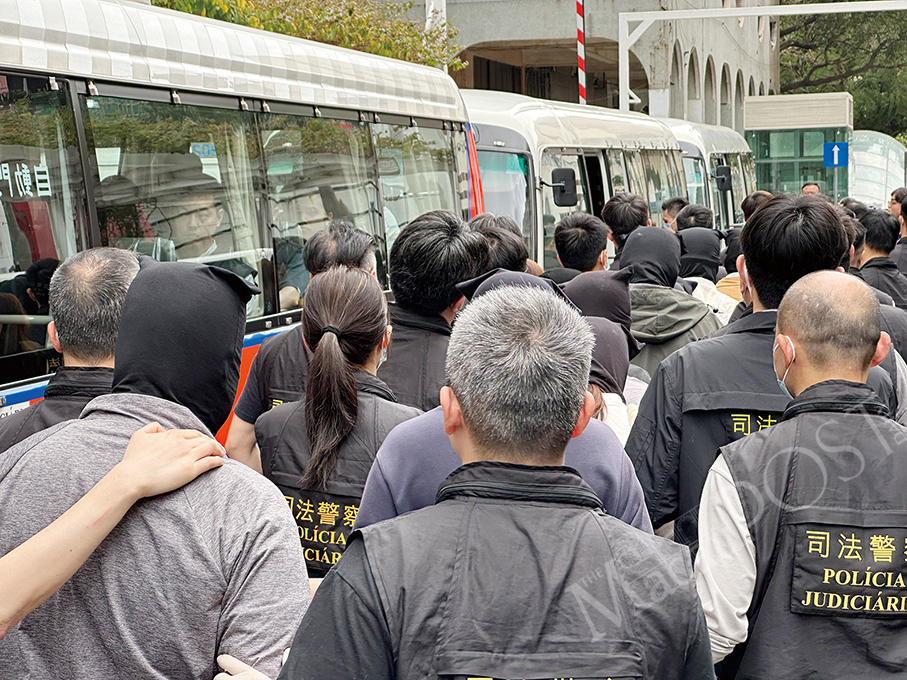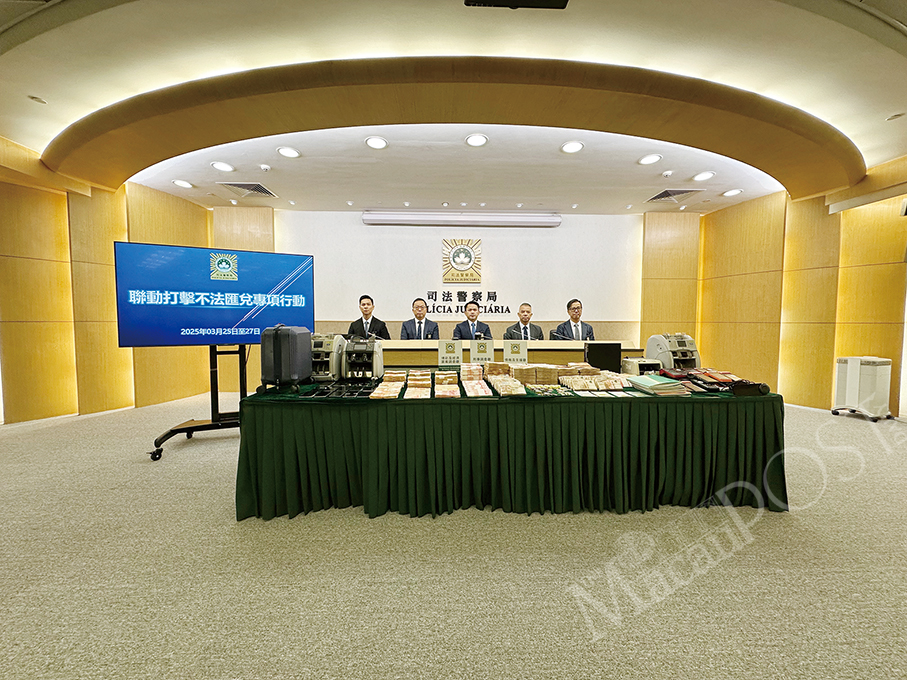The Judiciary Police (PJ) held yesterday a special press conference, during which PJ Deputy Director Sou Sio Keong announced that the Judiciary Police, in conjunction with their counterparts in the mainland, dismantled two cross-border currency exchange gangs on Tuesday, the larger of which represented the biggest such case since the Law on Combating Illegal Gambling Crimes took effect last year, involving 33 suspects – 22 of whom are Macau residents, with a total value of HK$590 million in currency exchanges.
The press conference was held yesterday morning at the PJ headquarters in Zape.
The smaller gang involved seven local and two mainland suspects, comprising seven men and two women aged between 25 and 52. The suspects identified themselves as casino PR staff and the owner of a restaurant, among others jobs.
The larger gang comprised 33 suspects, 19 males and 14 females, aged between 30 and 60, identifying themselves to the police as businessmen, salespersons and deliverymen. The mainland police have arrested over 20 members of the first gang, including its suspected kingpin and other key members, in various provinces and cities such as Anhui, Fujian and Guangdong.
The law has been in effect since October 29 last year – and Sou said that the Judiciary Police have maintained a steadfast approach to combat illegal currency exchange activities in Macau, including conducting regular proactive policing, gathering intelligence through various channels, and launching ad hoc joint operations at irregular intervals.
The Judiciary Police, through intelligence obtained from mainland police and related crime reports, identified the two criminal gangs and conducted a large-scale operation on Tuesday afternoon. In the operation targeting the smaller gang, 35 PJ officers were dispatched to seven residential flats in the northern district and Cotai, as well as a restaurant in the city centre, where the officers seized over HK$4.3 million, 196,000 patacas and 19,500 in cash, multiple mobile phones, and a vehicle used for criminal activities. In the operation targeting the larger gang, more than 80 PJ officers swooped on seven jewellery shops in various large casino-hotel resorts in Cotai, a pawn shop and an office in a commercial centre in Zape, an underground bank and several residential flats in the northern district, seizing key evidence including over HK$18 million in cash, a small amount of casino chips, 48 electronic devices, 12 financial ledgers, and false transaction documents and invoices.
According to Sou, the investigation into the larger gang was initiated after the Public Prosecutions Office (MP) authorised the Judiciary Police to follow up on a case involving illegal currency exchange activities related to gambling. The investigation, as noted by Sou, revealed that the suspects had established a limited company, using it as a legal entity to open several physical shops near casinos in Cotai and the central district, all under the guise of retailing jewellery and high-end goods. They facilitated currency exchanges for gamblers through three methods: using local financial institutions’ point-of-sale (POS) machines to provide cash during credit card or digital purchases via fake transactions in their “jewellery shops”; providing cash in Hong Kong dollars to gamblers after receiving transfers in yuan from them; and directly assisting gamblers by converting their winnings from gambling for yuan.
Sou noted that the larger gang began establishing shops in or around local casinos to conduct illegal currency exchange activities in 2019. Since the law came into effect, the amount involved in their illegal exchange activities had reached HK$590 million, with earnings exceeding HK$20 million. According to the Judiciary Police, the funds were provided by the gang’s kingpin, who closely collaborated with an underground bank in the northern district, with specialist members responsible for the transfer and flow of funds, circumventing external regulations and making a profit by manipulating exchange rate differences.
Reportedly, most of the suspects from the larger gang identified themselves as salespersons – and Sou said that staff members at the shops also participated in the criminal activities by providing the gang with their personal payment instruments or online banking accounts in exchange for a commission of 0.3 percent on each deal.
Meanwhile, the smaller gang exchanged HK$200 million and earned over HK$1 million in illicit funds. The kingpin in the mainland communicated with his downline members through various means, including messaging apps, and assigned members in Macau to carry out currency exchange activities. Among them, the Judiciary Police discovered that a suspect had been tasked with travelling to Hong Kong to collect cash and bring it to Macau.
All the suspects from the two gangs were transferred to the Public Prosecutions Office yesterday, facing a range of charges, including organised crime and illegal currency exchange activities.
Sou emphasised during the press conference that in their follow-up investigation the focus will be on probing the sources and flow of funds, while also continuing to track down any possible suspects still at large.

The hooded suspects from the larger of the two currency exchange gangs busted by the Judiciary Police (PJ) queue up at a PJ van outside the PJ headquarters in Zape yesterday. – Photos: Yuki Lei

Judiciary Police (PJ) senior officials, including Deputy Director Sou Sio Keong (centre), pose during yesterday’s press conference while evidence seized from the two currency exchange gangs is on display.







